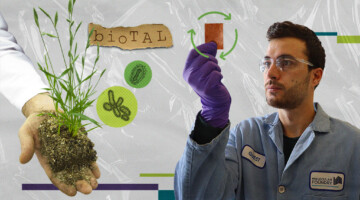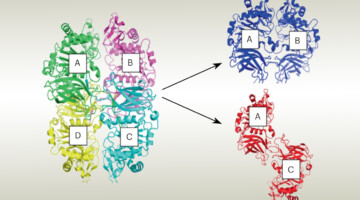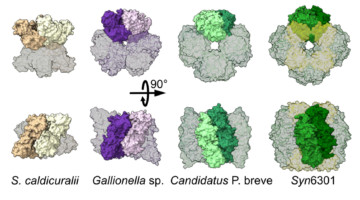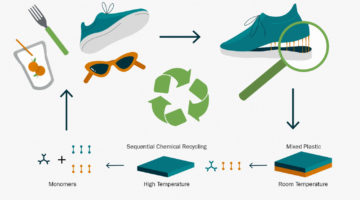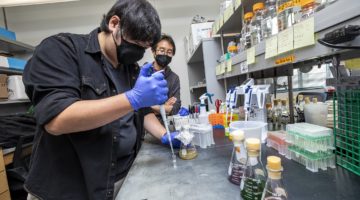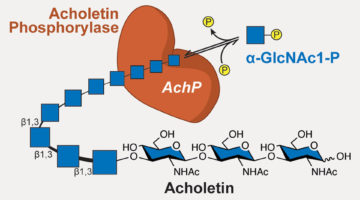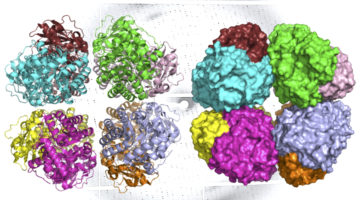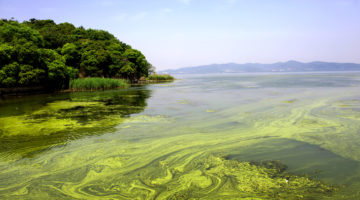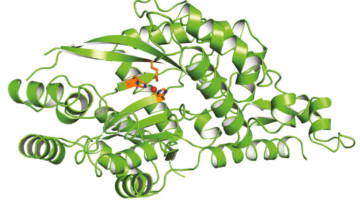Scientists engineered microbes to make the ingredients for recyclable plastics—replacing finite, polluting petrochemicals with sustainable alternatives. The new approach shows that renewable, recyclable plastics are not only possible, but also outperform those from petrochemicals. Read more »
Plant Enzyme Builds Polymers That Fortify Cell Walls
With data obtained at the ALS, researchers gained insight into how an enzyme orchestrates the synthesis of a pectin polymer that imparts strength and flexibility to plant cell walls. The work could lead to improved biofuel production and guide the design of polymers with tailored functionalities for industrial or biomedical applications. Read more »![]()
![]()
Protein Assemblies Show Surprising Variability
Protein-structure studies performed in part at the ALS helped researchers discover that the protein assemblies in a key carbon-cycling enzyme can rearrange with surprising ease. The findings raise the prospect of genetically tuning the protein in agricultural plant species to produce more productive and resource-efficient crops. Read more »![]()
![]()
A New Material System for Mixed-Plastic Recycling
Scientists have designed a new material system to overcome one of the biggest challenges in recycling consumer products: mixed-plastic recycling. Their achievement will help enable a much broader range of fully recyclable plastic products and brings into reach an efficient circular economy for durable goods like automobiles. Read more »
Protein Structures Aren’t Set in Stone
A group of researchers studying the world’s most abundant protein, an enzyme involved in photosynthesis called rubisco, showed how evolution can lead to a surprising diversity of molecular assemblies that all accomplish the same task. The findings reveal the possibility that many of the proteins we thought we knew actually exist in other, unknown shapes. Read more »
Designer Materials to Keep Plastic Out of Landfills
Scientists have designed a new material system to overcome one of the biggest challenges in recycling consumer products: mixed-plastic recycling. Their achievement will help enable a much broader range of fully recyclable plastic products and brings into reach an efficient circular economy for durable goods like automobiles. Read more »
Bacterial Enzyme Produces Biodegradable Polymer
Researchers discovered a bacterial enzyme that synthesizes a biopolymer whose repeating units are linked together in way that had not been previously observed. The new polymer is biodegradable and may be biocompatible, with potential for applications ranging from medical therapeutics to eco-friendly plastic alternatives. Read more »![]()
![]()
Newly Discovered Photosynthesis Enzyme Yields Evolutionary Clues
Scientists have discovered a primitive form of rubisco, a photosynthesis enzyme that has helped shape life on Earth. Detailed information about its structure, determined using complementary techniques at the ALS, will help scientists understand how carbon-fixing organisms oxygenated the atmosphere and how modern plants evolved. Read more »
Study Finds ‘Missing Link’ in the Evolutionary History of Carbon-Fixing Protein Rubisco
Scientists discovered an ancient form of rubisco, the most abundant enzyme on Earth and critical to life as we know it. Found in previously unknown environmental microbes, the newly identified rubisco provides insight into the evolution of the photosynthetic organisms that underlie the planet’s food chains. Read more »
Missing Lysine Link Could Improve Plant-Based Nutrition
To engineer crops with higher levels of the important amino acid, lysine, researchers solved the structure of an enzyme that helps break down lysine in plants. A fuller understanding of the factors affecting lysine levels should aid in the successful development of stable high-lysine crops to combat malnutrition globally. Read more »
